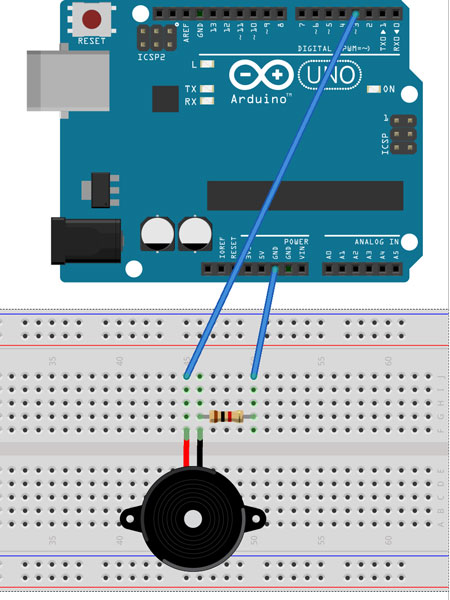
Este es el código de la música de Starwars. Poner el altavoz en el pin digital 7 y un potenciómetro en el pin analógico A0 (los otros dos pines del potenciómetro van a GND y 5V).
También puedes descargarlo aquí
-------------------------------------------------------------------------------------------
/* Star Wars Song Selector
-----------
Program to choose between two melodies by using a potentiometer and a piezo buzzer.
Inspired by: https://code.google.com/p/rbots/source/browse/trunk/StarterKit/Lesson5_PiezoPlayMelody/Lesson5_PiezoPlayMelody.pde
*/
// TONES //
// Defining the relationship between note, period & frequency.
// period is in microsecond so P = 1/f * (1E6)
#define c3 7634
#define d3 6803
#define e3 6061
#define f3 5714
#define g3 5102
#define a3 4545
#define b3 4049
#define c4 3816 // 261 Hz
#define d4 3401 // 294 Hz
#define e4 3030 // 329 Hz
#define f4 2865 // 349 Hz
#define g4 2551 // 392 Hz
#define a4 2272 // 440 Hz
#define a4s 2146
#define b4 2028 // 493 Hz
#define c5 1912 // 523 Hz
#define d5 1706
#define d5s 1608
#define e5 1517 // 659 Hz
#define f5 1433 // 698 Hz
#define g5 1276
#define a5 1136
#define a5s 1073
#define b5 1012
#define c6 955
#define R 0 // Define a special note, 'R', to represent a rest
// SETUP //
int speakerOut = 9; // Set up speaker on digital pin 7
int potPin = A0; // Set up potentiometer on analogue pin 0.
void setup() {
pinMode(speakerOut, OUTPUT);
Serial.begin(9600); // Set serial out if we want debugging
}
//}
// MELODIES and TIMING //
// melody[] is an array of notes, accompanied by beats[],
// which sets each note's relative length (higher #, longer note)
// Melody 1: Star Wars Imperial March
int melody1[] = { a4, R, a4, R, a4, R, f4, R, c5, R, a4, R, f4, R, c5, R, a4, R, e5, R, e5, R, e5, R, f5, R, c5, R, g5, R, f5, R, c5, R, a4, R};
int beats1[] = { 50, 20, 50, 20, 50, 20, 40, 5, 20, 5, 60, 10, 40, 5, 20, 5, 60, 80, 50, 20, 50, 20, 50, 20, 40, 5, 20, 5, 60, 10, 40, 5, 20, 5, 60, 40};
// Melody 2: Star Wars Theme
int melody2[] = { f4, f4, f4, a4s, f5, d5s, d5, c5, a5s, f5, d5s, d5, c5, a5s, f5, d5s, d5, d5s, c5};
int beats2[] = { 21, 21, 21, 128, 128, 21, 21, 21, 128, 64, 21, 21, 21, 128, 64, 21, 21, 21, 128 };
int MAX_COUNT = sizeof(melody1) / 2; // Melody length, for looping.
long tempo = 10000; // Set overall tempo
int pause = 1000; // Set length of pause between notes
int rest_count = 50; // Loop variable to increase Rest length (BLETCHEROUS HACK; See NOTES)
// Initialize core variables
int toneM = 0;
int beat = 0;
long duration = 0;
int potVal = 0;
// PLAY TONE //
// Pulse the speaker to play a tone for a particular duration
void playTone() {
long elapsed_time = 0;
if (toneM > 0) { // if this isn't a Rest beat, while the tone has
// played less long than 'duration', pulse speaker HIGH and LOW
while (elapsed_time < duration) {
digitalWrite(speakerOut, HIGH);
delayMicroseconds(toneM / 2);
// DOWN
digitalWrite(speakerOut, LOW);
delayMicroseconds(toneM / 2);
// Keep track of how long we pulsed
elapsed_time += (toneM);
}
}
else { // Rest beat; loop times delay
for (int j = 0; j < rest_count; j++) { // See NOTE on rest_count
delayMicroseconds(duration);
}
}
}
// LOOP //
void loop() {
potVal = analogRead(potPin); //Read potentiometer value and store in potVal variable
Serial.println(potVal); // Print potVal in serial monitor
if (potVal < 511) { // If potVal is less than 511, play Melody1...
// Set up a counter to pull from melody1[] and beats1[]
for (int i = 0; i < MAX_COUNT; i++) {
toneM = melody1[i];
beat = beats1[i];
duration = beat * tempo; // Set up timing
playTone(); // A pause between notes
delayMicroseconds(pause);
}
}
else // ... else play Melody2
for (int i = 0; i < MAX_COUNT; i++) {
toneM = melody2[i];
beat = beats2[i];
duration = beat * tempo; // Set up timing
playTone(); // A pause between notes
delayMicroseconds(pause);
}
}
/*
NOTES
The program purports to hold a tone for 'duration' microseconds.
Lies lies lies! It holds for at least 'duration' microseconds, _plus_
any overhead created by incremeting elapsed_time (could be in excess of
3K microseconds) _plus_ overhead of looping and two digitalWrites()
As a result, a tone of 'duration' plays much more slowly than a rest
of 'duration.' rest_count creates a loop variable to bring 'rest' beats
in line with 'tone' beats of the same length.
rest_count will be affected by chip architecture and speed, as well as
overhead from any program mods. Past behavior is no guarantee of future
performance. Your mileage may vary. Light fuse and get away.
*/